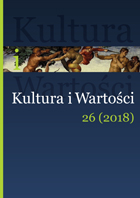Myślenie pojęciowe i rezonujące w Fenomenologii ducha Hegla
Conceptual and resonant thinking in Hegel’s Phenomenology of Spirit
Author(s): Artur JochlikSubject(s): 19th Century Philosophy, Contemporary Philosophy, German Idealism, Phenomenology, Ontology
Published by: Wydawnictwo Naukowe Uniwersytetu Marii Curie-Sklodowskiej
Keywords: Hegel; Žižek; conceptual thinking; resonant thinking;
Summary/Abstract: The author elaborates on the difference between conceptual and resonant thinking. According to Hegel there is just one pattern of thinking rather than two competing with each other. The principle of Hegel’s philosophy is predominantly based on ontic monism ensuing from the theory of self-developing concept. Tracing that development has become possible with the advent of absolute knowledge (along with the rise of German Idealism). The author argues that this was not adequately presented in S. Žižek’s Less than Nothing. For one, Žižek failed to underline the impact of Spinoza’s philosophy on Hegel. Neither did he clearly mark out the dividing line between Hegelian thinking and that which does go beyond it. As Žižek sees it the most important element in Hegel’s method is that what separates rather than what unites, that is understanding and not reason.
Journal: Kultura i Wartości
- Issue Year: 2018
- Issue No: 26
- Page Range: 63-93
- Page Count: 31
- Language: Polish

